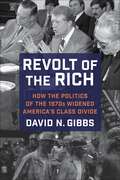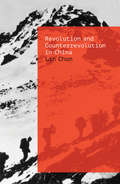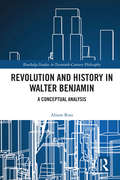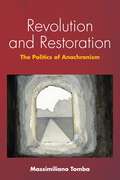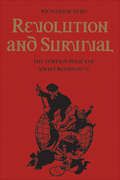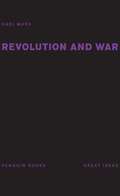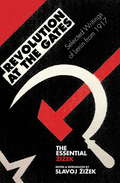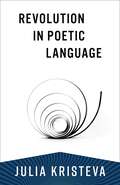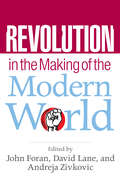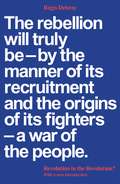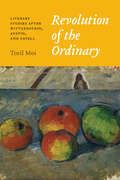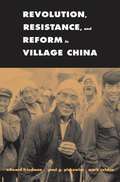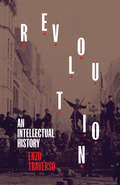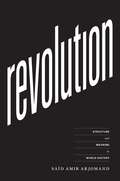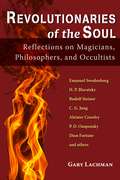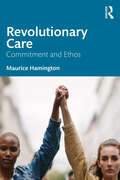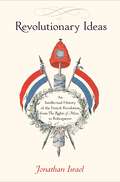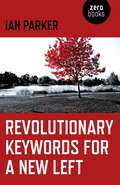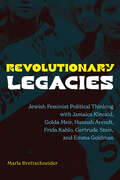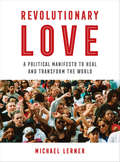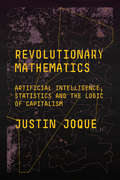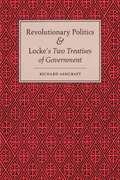- Table View
- List View
Revolt of the Rich: How the Politics of the 1970s Widened America's Class Divide
by David GibbsInequality in the United States has reached staggering proportions, with a massive share of wealth held by the very richest. How was such a dramatic shift in favor of a narrow elite possible in a democratic society? David N. Gibbs explores the forces that shaped the turn toward free market economics and wealth concentration and finds their roots in the 1970s. He argues that the political transformations of this period resulted from a “revolt of the rich,” whose defense of their class interests came at the expense of the American public.Drawing on extensive archival research, Gibbs examines how elites established broad coalitions that brought together business conservatives, social traditionalists, and militarists. At the very top, Richard Nixon’s administration quietly urged corporate executives to fund conservative think tanks and seeded federal agencies with free-market economists. Even Jimmy Carter’s ostensibly liberal administration brought deregulation to the financial sector along with the imposition of severe austerity measures that hurt the living standards of the working class. Through a potent influence campaign, academics and intellectuals sold laissez-faire to policy makers and the public, justifying choices to deregulate industry, cut social spending, curb organized labor, and offshore jobs, alongside expanding military interventions overseas.Shedding new light on the political alliances and policy decisions that tilted the playing field toward the ultrawealthy, Revolt of the Rich unveils the origins of today’s stark disparities.
Revolution and Counterrevolution in China
by Lin ChunA history of revolutionary China in the 20th centuryChina under XI Jingping has been experiencing unprecedented change. From the Belt and Road initiative to its involvement in Great Power struggles with the West, China is facing the world once more in the hope of reclaiming a lost Chinese greatness. But is "Socialism with Chinese Characteristics" just neoliberal capitalism under another name? And, if so, how can China reclaim the heritage of the Revolution in this its 70th anniversary?In this panoramic study of Chinese history in the twentieth century, Lin Chun argues that the paradoxes of contemporary Chinese society do not merely echo the tensions of modernity or capitalist development. Instead, they are a product of both the contradictions rooted in its revolutionary history, and the social and political consequences of its post-socialist transition. Revolution and Counterrevolution in China charts China's epic revolutionary trajectory in search of a socialist alternative to the global system, and asks whether market reform must repudiate and overturn the revolution and its legacy.
Revolution and History in Walter Benjamin: A Conceptual Analysis (Routledge Studies in Twentieth-Century Philosophy)
by Alison RossThis book places Benjamin’s writing on revolution in the context of his conception of historical knowledge. The fundamental problem that faces any analysis of Benjamin’s approach to revolution is that he deploys notions that belong to the domain of individual experience. His theory of modernity with its emphasis on the disintegration of collective experience further aggravates the problem. Benjamin himself understood the problem of revolution to be primarily that of the conceptualization of collective experience (its possibility and sites) under the conditions of modern bourgeois society. The novelty of his approach to revolution lies in the fact that he directly connects it with historical experience. Benjamin’s conception of revolution thus constitutes an integral part of his distinctive theory of historical knowledge, which is also essentially a theory of experience. Through a detailed study of Benjamin’s writings on the topics of the child and the dream, and an analysis of his ideas of history, the fulfilled wish, similitude and communist society, this book shows how the conceptual analysis of his corpus can get to the heart of Benjamin’s conception of revolutionary experience and distil its difficulties and mechanisms.
Revolution and Restoration: The Politics of Anachronism (Idiom: Inventing Writing Theory)
by Massimiliano TombaAt a time when terms like restoration, religion, authority, obligations, and natural law—once the rallying cries of the most emancipatory movements—are increasingly coopted by conservative forces, Revolution and Restoration offers a thought-provoking account of how “outdated” concepts can ignite radical energy and collective action. Through both historical and contemporary examples, the book elaborates the concrete possibilities for reimagining politics and society that emerge out of the clash between incompatible legal and economic structures.At its core, Tomba’s book confronts the very foundations of the modern state and its three pillars: property, democracy, and citizenship. These pillars, long celebrated in the Western canon, are nevertheless mechanisms of exclusion: property is the denial of communal access, representative democracy the marginalization of the demos from decision-making, and citizenship the exclusion of the foreigner. Revolution and Restoration critiques these pillars to show how new concepts and political possibilities that emerge from political and social conflicts hold the potential to transcend and remake democracies in crisis.Revolution and Restoration: The Politics of Anachronism is available from the Knowledge Unlatched on an open-access basis.
Revolution and Survival: The Foreign Policy of Soviet Russia 1917-18
by Richard DeboThis is a highly readable and absorbing account of Bolshevik foreign policy during Lenin's first year in power. In tracing the development of that policy, the book considers both the impact it had on a world torn by war and the effect it had on the Bolsheviks themselves, now no longer engaged in clandestine struggle but in effective state control. The book explores Lenin's relationship with the various elements of the party – his fruitful, but frequently discordant, relationship with Trotsky in particular – and the way he sought and obtained support for his policies in the tumultuous political circumstances of 1917 and 1918. It studies Lenin's political style as well, in an attempt to explain the shift from his utopianism of 1917 to his hard-headed political realism of 1918. The analysis focuses on the fundamental questions of how the Soviet state, lacking significant military forces in the midst of a world war, succeeded in surviving the first year of the revolution, and how it survived the new threat of the changed political situation at the end of the war. Revolution and Survival is the first history of Lenin's foreign policy during this crucial period, and Richard Debo has fused insight with style in a fascinating and authoritative book.
Revolution and War
by Karl MarxWritten during Karl Marx's brilliant career as a polemical journalist, these blazing pieces tackle subjects ranging from the strikes of angry British workers to insurrection in Europe, from the American Civil War to the misery of colonial rule in India, demonstrating the radical spirit and outrage at social injustice that would make him one of the most influential political philosophers of all time.Throughout history, some books have changed the world. They have transformed the way we see ourselves - and each other. They have inspired debate, dissent, war and revolution. They have enlightened, outraged, provoked and comforted. They have enriched lives - and destroyed them. Now Penguin brings you the works of the great thinkers, pioneers, radicals and visionaries whose ideas shook civilization and helped make us who we are.
Revolution at the Gates
by V. I. Lenin Slavoj ZizekThe idea of a Lenin renaissance might well provoke an outburst of sarcastic laughter. Marx is OK, but Lenin? Doesn't he stand for the big catastrophe which left its mark on the entire twentieth-century?Lenin, however, deserves wider consideration than this, and his writings of 1917 are testament to a formidable political figure. They reveal his ability to grasp the significance of an extraordinary moment in history. Everything is here, from Lenin-the-ingenious-revolutionary-strategist to Lenin-of-the-enacted-utopia. To use Kierkegaard's phrase, what we can glimpse in these writings is Lenin-in-becoming: not yet Lenin-the-Soviet-institution, but Lenin thrown into an open, contingent situation.In Revolution at the Gates, Slavoj i ek locates the 1917 writings in their historical context, while his afterword tackles the key question of whether Lenin can be reinvented in our era of "cultural capitalism." i ek is convinced that, whatever the discussion--the forthcoming crisis of capitalism, the possibility of a redemptive violence, the falsity of liberal tolerance--Lenin's time has come again.
Revolution in Poetic Language (European Perspectives: A Series in Social Thought and Cultural Criticism)
by Julia KristevaIn Revolution in Poetic Language, Julia Kristeva explicates her foundational distinction between the semiotic and the symbolic and explores their interrelationships. Linking the psychosomatic to the literary and the literary to a larger political horizon, she questions the premises of linguistic, psychoanalytic, philosophical, and literary theories.
Revolution in the Making of the Modern World: Social Identities, Globalization and Modernity
by David Lane John Foran Andreja ZivkovicThis volume questions whether ideas of revolution are still relevant in the postmodern and globalized world of the twenty-first century. Featuring contributions from some of the world's leading sociological and political thinkers on revolution, it combines theoretical concerns with a variety of detailed case studies of individual revolutions. Subjects covered include: democracy and revolution from 1789 to 1989 twentieth century revolutions and theories of revolution, including Marxism, modernization and structuralist theories revolution in the "Third World" and the variable geometry of the paths to modernity Islamic revolutions and modernity the 1989 revolutions as "democratic revolutions" or "elite-led transitions" globalization, the nation-state and revolution empire and "democratic revolution" network society and revolution Islamic fundamentalism, international terrorism and revolution democratic revolution as a new form of revolution postmodern theories of revolution new social movements, identities and new figures of revolution. Revolution in the Making of the Modern World will be essential reading for students and scholars of comparative politics, political theory, revolution and political sociology.
Revolution in the Revolution?
by Regis DebrayRevolution in the Revolution? is a brilliant, pragmatic assessment of the situation in Latin America in the 1960s. First published in 1967, it became a controversial handbook for guerrilla warfare and revolution, read alongside Che’s own pamphlets, and remains fully as important as the writings of Guevara. Lucid and compelling, it spares no personage, no institution, and no concept, taking on not only Russian and Chinese strategies but Trotskyism as well.The year it was published, Debray was convicted of having been part of Guevara’s guerrilla group and sentenced to thirty years in prison. He was released in 1970, following an international campaign, which included appeals by Jean-Paul Sartre, André Malraux, General Charles de Gaulle and Pope Paul VI.
Revolution of the Ordinary: Literary Studies after Wittgenstein, Austin, and Cavell
by Toril MoiThis radically original book argues for the power of ordinary language philosophy—a tradition inaugurated by Ludwig Wittgenstein and J. L. Austin, and extended by Stanley Cavell—to transform literary studies. In engaging and lucid prose, Toril Moi demonstrates this philosophy’s unique ability to lay bare the connections between words and the world, dispel the notion of literature as a monolithic concept, and teach readers how to learn from a literary text. Moi first introduces Wittgenstein’s vision of language and theory, which refuses to reduce language to a matter of naming or representation, considers theory’s desire for generality doomed to failure, and brings out the philosophical power of the particular case. Contrasting ordinary language philosophy with dominant strands of Saussurean and post-Saussurean thought, she highlights the former’s originality, critical power, and potential for creative use. Finally, she challenges the belief that good critics always read below the surface, proposing instead an innovative view of texts as expression and action, and of reading as an act of acknowledgment. Intervening in cutting-edge debates while bringing Wittgenstein, Austin, and Cavell to new readers, Revolution of the Ordinary will appeal beyond literary studies to anyone looking for a philosophically serious account of why words matter.
Revolution, Resistance, and Reform in Village China
by Edward Friedman Mark Selden Paul G. PickowiczDrawing on more than a quarter century of field and documentary research in rural North China, this book explores the contested relationship between village and state from the 1960s to the start of the twenty-first century. The authors provide a vivid portrait of how resilient villagers struggle to survive and prosper in the face of state power in two epochs of revolution and reform. Highlighting the importance of intra-rural resistance and rural-urban conflicts to Chinese politics and society in the Great Leap and Cultural Revolution, the authors go on to depict the dynamic changes that have transformed village China in the post-Mao era. This book continues the dramatic story in the authors' prizewinningChinese Village, Socialist State. Plumbing previously untapped sources, including interviews, archival materials, village records and unpublished memoirs, diaries and letters, the authors capture the struggles, pains and achievements of villagers across three generations of social upheaval.
Revolution: An Intellectual History
by Enzo TraversoA cultural and intellectual balance-sheet of the twentieth century's age of revolutionsThis book reinterprets the history of nineteenth and twentieth-century revolutions by composing a constellation of "dialectical images": Marx's "locomotives of history," Alexandra Kollontai's sexually liberated bodies, Lenin's mummified body, Auguste Blanqui's barricades and red flags, the Paris Commune's demolition of the Vendome Column, among several others. It connects theories with the existential trajectories of the thinkers who elaborated them, by sketching the diverse profiles of revolutionary intellectuals--from Marx and Bakunin to Luxemburg and the Bolsheviks, from Mao and Ho Chi Minh to José Carlos Mariátegui, C.L.R. James, and other rebellious spirits from the South--as outcasts and pariahs. And finally, it analyzes the entanglement between revolution and communism that so deeply shaped the history of the twentieth century. This book thus merges ideas and representations by devoting an equal importance to theoretical and iconographic sources, offering for our troubled present a new intellectual history of the revolutionary past.
Revolution: Structure and Meaning in World History
by Saïd Amir ArjomandA revolution is a discontinuity: one political order replaces another, typically through whatever violent means are available. Modern theories of revolutions tend neatly to bracket the French Revolution of 1789 with the fall of the Soviet Union two hundred years later, but contemporary global uprisings—with their truly multivalent causes and consequences—can overwhelm our ability to make sense of them. In this authoritative new book, Saïd Amir Arjomand reaches back to antiquity to propose a unified theory of revolution. Revolution illuminates the stories of premodern rebellions from the ancient world, as well as medieval European revolts and more recent events, up to the Arab Spring of 2011. Arjomand categorizes revolutions in two groups: ones that expand the existing body politic and power structure, and ones that aim to erode—but paradoxically augment—their authority. The revolutions of the past, he tells us, can shed light on the causes of those of the present and future: as long as centralized states remain powerful, there will be room for greater, and perhaps forceful, integration of the politically disenfranchised.
Revolutionaries of the Soul
by Gary LachmanExplorers of occult mysteries and the edges of consciousness change the way we view not only the nature of reality, but also our deepest sense of self. Insightful author Gary Lachman presents punchy, enlightening, and intriguing biographies of some of the most influential esoteric luminaries in recent history. His 16 subjects include Swedish mystical scientist Emanuel Swedenborg; H. P. Blavatsky, Russian cofounder of the Theosophical Society; Austrian philosopher Rudolf Steiner, who inspired the Waldorf School of education; Swiss visionary C. G. Jung, founder of depth psychology; notorious English ceremonial magician Aleister Crowley; Russian esotericist P. D. Ouspensky, explicator of Gurdjieff's early works; and British psychic artist Dion Fortune, who was influential in the modern revival of magical arts.
Revolutionary Care: Commitment and Ethos
by Maurice HamingtonWritten by one of the world’s most respected care scholars, Revolutionary Care provides original theoretical insights and novel applications to offer a comprehensive approach to care as personal, political, and revolutionary. The text has nine chapters divided into two major sections. Section 1, "Thinking About Better Care," offers four theoretical chapters that reinforce the primacy of care as a moral ideal worthy of widespread commitment across ideological and cultural differences. Unlike other moral approaches, care is framed as a process morality and provides a general trajectory that can only determine the best course of action in the moment/context of need. Section 2, "Invitations and Provocations: Imagining Transformative Possibilities," employs four case studies on toxic masculinity, socialism and care economy, humanism and posthumanism, pacifism, and veganism to demonstrate the radical and revolutionary nature of care. Exploring the thinking and writing of many disciplines, including authors of color, queer scholars, and indigenous thinkers, this book is an exciting and cutting-edge contribution to care ethics scholarship as well as a useful teaching resource.
Revolutionary Ideas: An Intellectual History of the French Revolution from The Rights of Man to Robespierre
by Jonathan IsraelHow the Radical Enlightenment inspired and shaped the French RevolutionHistorians of the French Revolution used to take for granted what was also obvious to its contemporary observers—that the Revolution was shaped by the radical ideas of the Enlightenment. Yet in recent decades, scholars have argued that the Revolution was brought about by social forces, politics, economics, or culture—almost anything but abstract notions like liberty or equality. In Revolutionary Ideas, one of the world's leading historians of the Enlightenment restores the Revolution’s intellectual history to its rightful central role. Drawing widely on primary sources, Jonathan Israel shows how the Revolution was set in motion by radical eighteenth-century doctrines, how these ideas divided revolutionary leaders into vehemently opposed ideological blocs, and how these clashes drove the turning points of the Revolution.In this compelling account, the French Revolution stands once again as a culmination of the emancipatory and democratic ideals of the Enlightenment. That it ended in the Terror represented a betrayal of those ideas—not their fulfillment.
Revolutionary Keywords for a New Left
by Ian ParkerRevolutionary Keywords for a New Left comprises short essays on fifty revolutionary keywords, each word being put to work on a contemporary political issue. With keywords ranging from academicisation to neoliberalism, from postcolonial to Zionism and with subjects including, Badiou, North Korea, sexual violence and Žižek, the book concludes with an essay mapping the development of progressive keywords before our century of revolution, which began in 1917, keywords that emerged in the fifty years of struggle between 1917 and 1967, and revolutionary keywords for the new left today.
Revolutionary Legacies: Jewish Feminist Political Thinking with Jamaica Kincaid, Golda Meir, Hannah Arendt, Frida Kahlo, Gertrude Stein, and Emma Goldman (SUNY series in Feminist Criticism and Theory)
by Marla BrettschneiderThis book provides a timely new transnational lineage of Jewish feminist revolutionary legacies. Using extensive research, deep thinking, and a bold methodology, Marla Brettschneider tousles with a host of anti-colonial, feminist, anti-racist, and queer troublemakers—Jamaica Kincaid, Golda Meir, Hannah Arendt, Frida Kahlo, Gertrude Stein, and Emma Goldman. Brettschneider brings together these feisty women's lives, work, politics, thinking, and art to wrestle with big questions: How can we make our lives, individually and collectively, in our diversity as Jews and in grounded solidarity with others? How do these women bring out otherwise unidentified, unnamed, and underexamined issues in Jewish studies, feminism, politics, and a range of critical theories? Revolutionary Legacies invites Jews, feminists, anti-racists, and all manner of justice seekers to think, and create common cause, with these rabblerousers.
Revolutionary Love: A Political Manifesto to Heal and Transform the World
by Michael LernerFrom social theorist and psychotherapist Rabbi Michael Lerner comes a strategy for a new socialism built on love, kindness, and compassion for one another. Revolutionary Love proposes a method to replace what Lerner terms the “capitalist globalization of selfishness” with a globalization of generosity, prophetic empathy, and environmental sanity.Lerner challenges liberal and progressive forces to move beyond often weak-kneed and visionless politics to build instead a movement that can reverse the environmental destructiveness and social injustice caused by the relentless pursuit of economic growth and profits. Revisiting the hidden injuries of class, Lerner shows that much of the suffering in our society—including most of its addictions and the growing embrace of right-wing nationalism and reactionary versions of fundamentalism—is driven by frustrated needs for community, love, respect, and connection to a higher purpose in life. Yet these needs are too often missing from liberal discourse. No matter that progressive programs are smartly constructed—they cannot be achieved unless they speak to the heart and address the pain so many people experience.Liberals and progressives need coherent alternatives to capitalism, but previous visions of socialism do not address the yearning for anything beyond material benefits. Inspired by Herbert Marcuse, Erich Fromm, and Carol Gilligan, Revolutionary Love offers a strategy to create the “Caring Society.” Lerner details how a civilization infused with love could put an end to global poverty, homelessness, and hunger, while democratizing the economy, shifting to a twenty-eight-hour work week, and saving the life-support system of Earth. He asks that we develop the courage to stop listening to those who tell us that fundamental social transformation is “unrealistic.”
Revolutionary Mathematics: Artificial Intelligence, Statistics and the Logic of Capitalism
by Justin JoqueTraces the revolution in statistics that gave rise to artificial intelligence and predictive algorithms refiguring contemporary capitalism.Our finances, politics, media, opportunities, information, shopping and knowledge production are mediated through algorithms and their statistical approaches to knowledge; increasingly, these methods form the organizational backbone of contemporary capitalism. Revolutionary Mathematics traces the revolution in statistics and probability that has quietly underwritten the explosion of machine learning, big data and predictive algorithms that now decide many aspects of our lives. Exploring shifts in the philosophical understanding of probability in the late twentieth century, Joque shows how this was not merely a technical change but a wholesale philosophical transformation in the production of knowledge and the extraction of value. This book provides a new and unique perspective on the dangers of allowing artificial intelligence and big data to manage society. It is essential reading for those who want to understand the underlying ideological and philosophical changes that have fueled the rise of algorithms and convinced so many to blindly trust their outputs, reshaping our current political and economic situation.
Revolutionary Politics And Locke's Two Treatises Of Government
by Richard AshcraftRichard Ashcraft offers a new interpretation of the political thought of John Locke by viewing his ideas, especially those in the Two Treatises of Government, in the context of his political activity. Linking the implications of Locke's political theory with his practical politics, Professor Ashcraft focuses on Locke's involvement with the radical Whigs, who challenged the established order in England from the 1670s to the 1690s. An equally important aim of the author is to provide a case study of a revolutionary movement that includes a discussion of its organization, ideology, socio-economic composition, and political activities. Based upon a detailed examination of manuscripts, diaries, correspondence, and newspapers, Professor Ashcraft presents a wealth of new historical evidence on the political life of Restoration England. This study represents an example of an approach to political theory that stresses the importance of authorial intentions and of the political, social, and economic influences that structure a particular political debate.
Revolutionary Politics and Locke's Two Treatises of Government
by Richard AshcraftRichard Ashcraft offers a new interpretation of the political thought of John Locke by viewing his ideas, especially those in the Two Treatises of Government, in the context of his political activity. Linking the implications of Locke's political theory with his practical politics, Professor Ashcraft focuses on Locke's involvement with the radical Whigs, who challenged the established order in England from the 1670s to the 1690s. An equally important aim of the author is to provide a case study of a revolutionary movement that includes a discussion of its organization, ideology, socio-economic composition, and political activities. Based upon a detailed examination of manuscripts, diaries, correspondence, and newspapers, Professor Ashcraft presents a wealth of new historical evidence on the political life of Restoration England. This study represents an example of an approach to political theory that stresses the importance of authorial intentions and of the political, social, and economic influences that structure a particular political debate.
Revolutionary Prophecies: The Founders and America’s Future (Jeffersonian America)
by Joanne B. FreemanThe America of the early republic was built on an experiment, a hopeful prophecy that would only be fulfilled if an enlightened people could find its way through its past and into a future. Americans recognized that its promises would only be fully redeemed at a future date. In Revolutionary Prophecies, renowned historians Robert M. S. McDonald and Peter S. Onuf summon a diverse cast of characters from the founding generation—all of whom, in different ways, reveal how their understanding of the past and present shaped hopes, ambitions, and anxieties for or about the future. The essays in this wide-ranging volume explore the historical consciousness of Americans caught up in the Revolution and its aftermath. By focusing on how various individuals and groups envisioned their future, the contributors show that revolutionary Americans knew they were making choices that would redirect the "course of human events." Looking at prominent leaders such as Washington, Adams, Franklin, Hamilton, Madison, and Monroe, as well as more common people, from backcountry rebels and American Indians to printer Isaiah Thomas, the authors illuminate the range and complexity of the ways in which men and women of the founding generation imagined their future—and made our history.
Revolutionary Republicanism: Participation and Representation in 1848 France (Routledge Studies in Radical History and Politics)
by Samuel HayatRevolutionary Republicanism provides a history of French republicanism seen through a seminal episode of its creation – the 1848 revolution. The process of reinventing republicanism in 1848 gave rise to two opposite understandings of republicanism: a moderate one that merely adapted the institutions of representative government to popular sovereignty, and a more radical, ‘social- democratic’ notion of republicanism, based on inclusive forms of representation and aiming at the emancipation of the proletariat. These two notions of republicanism unfolded over the course of the few critical months between the revolution of February 1848 and the uprising of June 1848, which saw the victory of the moderate one. Playing devil’s advocate to the traditional republican history that casts 1848 as a mere step in the continuous history of French republicanism, the book demonstrates that the events of the revolution amounted to a repression of all that the ‘Republic’ had meant up until that point, particularly the forms of participation and popular representation hitherto seen as constituting a republican regime. The text also sets out to chart the history of the ‘democratic and social Republic’, as the socialist and worker revolutionaries of 1848 called the radical republicanism they dreamed of founding and believed would fulfil the republican promise of emancipation. This book will appeal to all those with an interest in the French revolutions, and the history of radical ideas.
